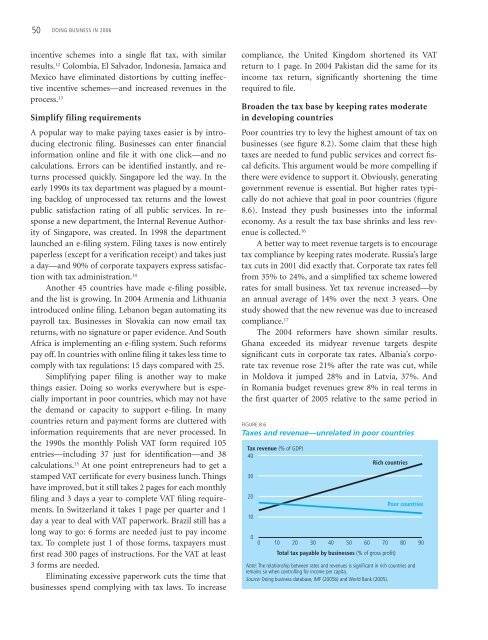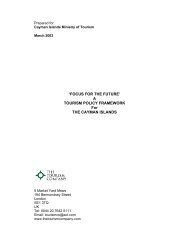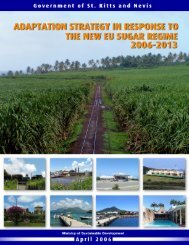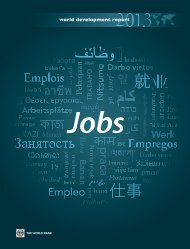Creating
Doing Business in 2006 -- Creating Jobs - Caribbean Elections
Doing Business in 2006 -- Creating Jobs - Caribbean Elections
Create successful ePaper yourself
Turn your PDF publications into a flip-book with our unique Google optimized e-Paper software.
50 DOING BUSINESS IN 2006<br />
incentive schemes into a single flat tax, with similar<br />
results. 12 Colombia, El Salvador, Indonesia, Jamaica and<br />
Mexico have eliminated distortions by cutting ineffective<br />
incentive schemes—and increased revenues in the<br />
process. 13<br />
Simplify filing requirements<br />
A popular way to make paying taxes easier is by introducing<br />
electronic filing. Businesses can enter financial<br />
information online and file it with one click—and no<br />
calculations. Errors can be identified instantly, and returns<br />
processed quickly. Singapore led the way. In the<br />
early 1990s its tax department was plagued by a mounting<br />
backlog of unprocessed tax returns and the lowest<br />
public satisfaction rating of all public services. In response<br />
a new department, the Internal Revenue Authority<br />
of Singapore, was created. In 1998 the department<br />
launched an e-filing system. Filing taxes is now entirely<br />
paperless (except for a verification receipt) and takes just<br />
a day—and 90% of corporate taxpayers express satisfaction<br />
with tax administration. 14<br />
Another 45 countries have made e-filing possible,<br />
and the list is growing. In 2004 Armenia and Lithuania<br />
introduced online filing. Lebanon began automating its<br />
payroll tax. Businesses in Slovakia can now email tax<br />
returns, with no signature or paper evidence. And South<br />
Africa is implementing an e-filing system. Such reforms<br />
pay off. In countries with online filing it takes less time to<br />
comply with tax regulations: 15 days compared with 25.<br />
Simplifying paper filing is another way to make<br />
things easier. Doing so works everywhere but is especially<br />
important in poor countries, which may not have<br />
the demand or capacity to support e-filing. In many<br />
countries return and payment forms are cluttered with<br />
information requirements that are never processed. In<br />
the 1990s the monthly Polish VAT form required 105<br />
entries—including 37 just for identification—and 38<br />
calculations. 15 At one point entrepreneurs had to get a<br />
stamped VAT certificate for every business lunch. Things<br />
have improved, but it still takes 2 pages for each monthly<br />
filing and 3 days a year to complete VAT filing requirements.<br />
In Switzerland it takes 1 page per quarter and 1<br />
day a year to deal with VAT paperwork. Brazil still has a<br />
long way to go: 6 forms are needed just to pay income<br />
tax. To complete just 1 of those forms, taxpayers must<br />
first read 300 pages of instructions. For the VAT at least<br />
3 forms are needed.<br />
Eliminating excessive paperwork cuts the time that<br />
businesses spend complying with tax laws. To increase<br />
compliance, the United Kingdom shortened its VAT<br />
return to 1 page. In 2004 Pakistan did the same for its<br />
income tax return, significantly shortening the time<br />
required to file.<br />
Broaden the tax base by keeping rates moderate<br />
in developing countries<br />
Poor countries try to levy the highest amount of tax on<br />
businesses (see figure 8.2). Some claim that these high<br />
taxes are needed to fund public services and correct fiscal<br />
deficits. This argument would be more compelling if<br />
there were evidence to support it. Obviously, generating<br />
government revenue is essential. But higher rates typically<br />
do not achieve that goal in poor countries (figure<br />
8.6). Instead they push businesses into the informal<br />
economy. As a result the tax base shrinks and less revenue<br />
is collected. 16<br />
A better way to meet revenue targets is to encourage<br />
tax compliance by keeping rates moderate. Russia’s large<br />
tax cuts in 2001 did exactly that. Corporate tax rates fell<br />
from 35% to 24%, and a simplified tax scheme lowered<br />
rates for small business. Yet tax revenue increased—by<br />
an annual average of 14% over the next 3 years. One<br />
study showed that the new revenue was due to increased<br />
compliance. 17<br />
The 2004 reformers have shown similar results.<br />
Ghana exceeded its midyear revenue targets despite<br />
significant cuts in corporate tax rates. Albania’s corporate<br />
tax revenue rose 21% after the rate was cut, while<br />
in Moldova it jumped 28% and in Latvia, 37%. And<br />
in Romania budget revenues grew 8% in real terms in<br />
the first quarter of 2005 relative to the same period in

















